According to the federal government, DBEs are for-profit small businesses where socially and economically disadvantaged individuals own at least a 51% interest and also control management and daily business operations. Urban has long supported DBE firms, and not because it is a requirement. We do it because it is crucial to our profession, our peers, and our principles. To educate others about this side of the industry, we reached out to some DBEs that we have had the pleasure of watching get established and grow into thriving companies. Here is just a glimpse of their businesses.
Be Nimble
Alyson Lester
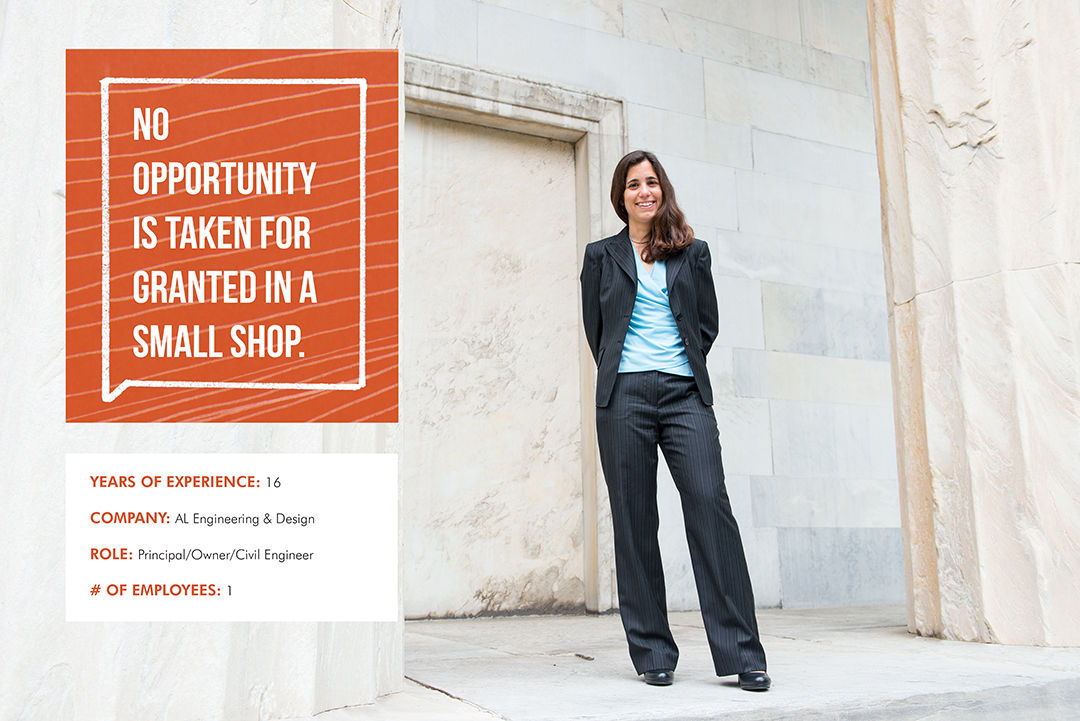
Alyson Lester, PE believes that a general love of science and having good mentors are the reasons her career has flourished. In 2007, she left Urban to start her own company, AL Engineering & Design. The relationships she accrued in the Philadelphia community, particularly with Urban, have helped her meet the ever-changing challenges that come with running a small business.
On being a DBE – When you’re this small, I think it’s easy to be forgotten; staying on the radar is a constant challenge. Also, being small allows you to be nimble. I believe the DBE program is most successful when small companies have a chance to prove themselves. No opportunity is taken for granted in a small shop. It is least successful when the system is abused – companies either cheating the system or taking advantage because they know the DBE pool is limited and their prime is more or less stuck with them. Critical issues facing our profession – Our industry seems to lag behind in terms of work flexibility. We could lose good talent to other professions where perks like flex-time, telecommuting, and part-time opportunities are more accessible. Her advice – Some aspects won’t change – we’re a business that needs to be billable. I suggest that employees plan ahead with their companies to figure out the situation that works best for them.
Robert Bright
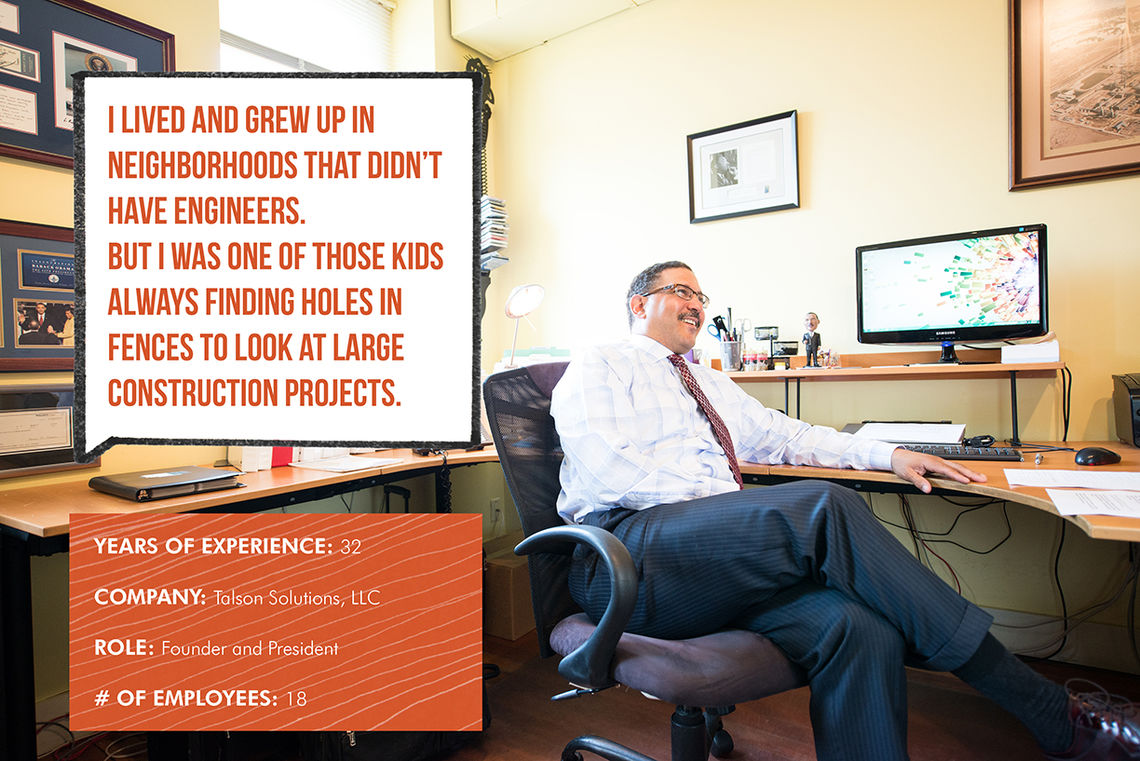
Robert S. Bright established Talson Solutions, LLC in 2001 hoping to create a family legacy. He named the company after his two kids, Taylor and Jason, who were seven and five at the time. This capital project consulting firm’s involvement in major projects like the construction monitoring and audit of the $750 million, one million-SF expansion of the Pennsylvania Convention Center in Philadelphia and the $5.2 billion Panama Canal Expansion Program, Third Set of Locks, have allowed the firm to double in size in the past five years.
Getting started – None of my family members were engineers. None of them even had college degrees. I lived and grew up in neighborhoods that didn’t have engineers. But I was one of those kids always finding holes in fences to look at large construction projects. Bringing sexy back – Kids today want to do the sexy projects. Back in the day, those projects were with NASA. The ones today are with Google, Microsoft, and Apple. Civil engineering has sexy projects, but we have to promote them and get people involved. We have to make our field of study more attractive for the younger generation. The key is giving more support to organizations that educate at the grass roots of public schools. On being a DBE – The term is a misnomer, really. The challenges we face are no different than with any other business. We still have to deliver and provide the right resources, and achieve long-term growth. Making it work – The teaming relationship is not a one-way street – we have to be willing to understand each other’s needs. I applaud Urban for supporting Talson as we grow and giving us opportunities on new projects. At the same time, as with any client, we have to deliver.
First Class
Louis Rodriguez
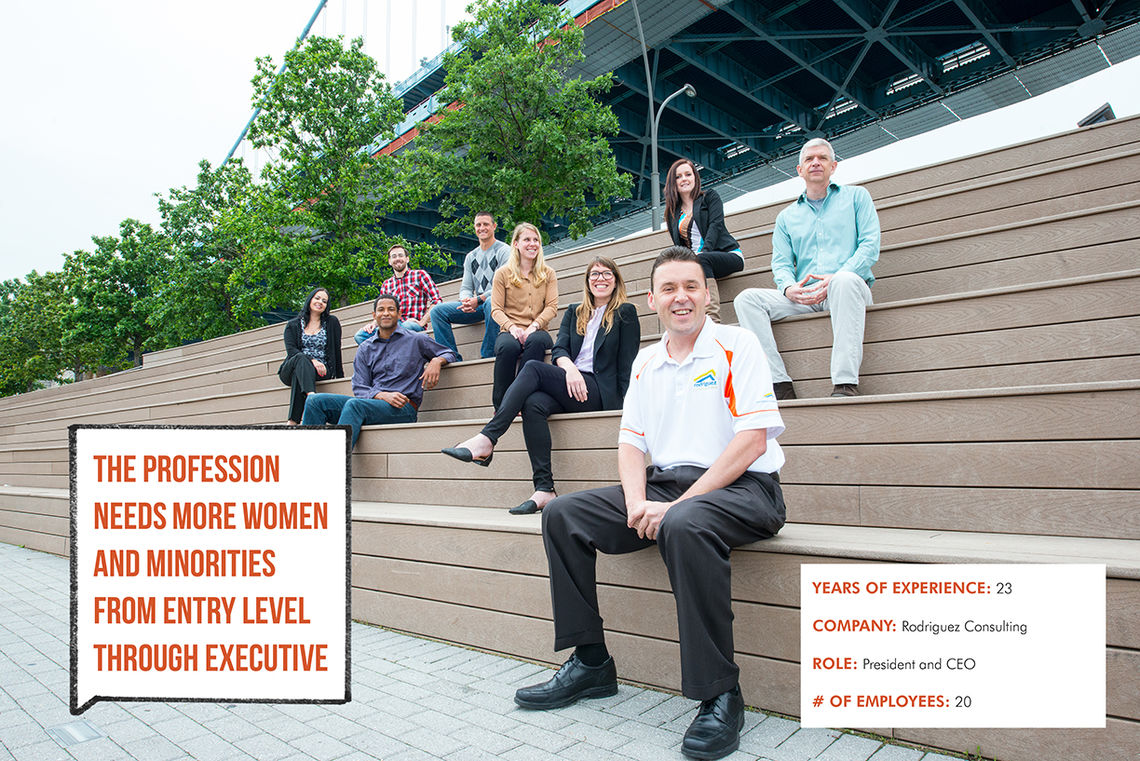
Louis Rodriguez’s idea for creating a consulting engineering company goes back 20 years to when he met with other engineers in his apartment to discuss forming their own firm. Although they never got it going, the meetings planted the seed for Rodriguez to start his own firm. As President/CEO of Rodriguez Consulting, his focus has been on building and maintaining a first-class culture that attracts top talent and makes his firm an exciting place to work.
On the importance of DBE programs – The success of small businesses is critical to the continued growth of our economy. The USA, through the Small Business Administration, runs an incredible DBE program that has helped create millions of successful small businesses. These programs are instrumental in allowing entrepreneurs to thrive and create jobs for millions of Americans. Road blocks – A big challenge to DBEs is “paid when paid” subcontracts to provide services on government contracts. In many cases, we are the first ones to start working and the last ones to get paid. Critical issues facing the engineering profession – Engineers, especially civil engineers, tend to be slow to adapt to technology compared to other professions. For example, architects have been designing in 3D for years and BIM is becoming common in their industry. However, I still find that most engineering firms still primarily design in 2D and have yet to figure out that you can add color to design drawings. Also, I feel civil engineering is challenged by a lack of diversity. The profession needs more women and minorities from entry level through executive. Choosing a career in engineering – Civil engineering is a great profession. My wife is a registered nurse and I’m a professional engineer. I always say that we have incredible job security because people will always be sick and roads always have potholes.
Janet Cunningham
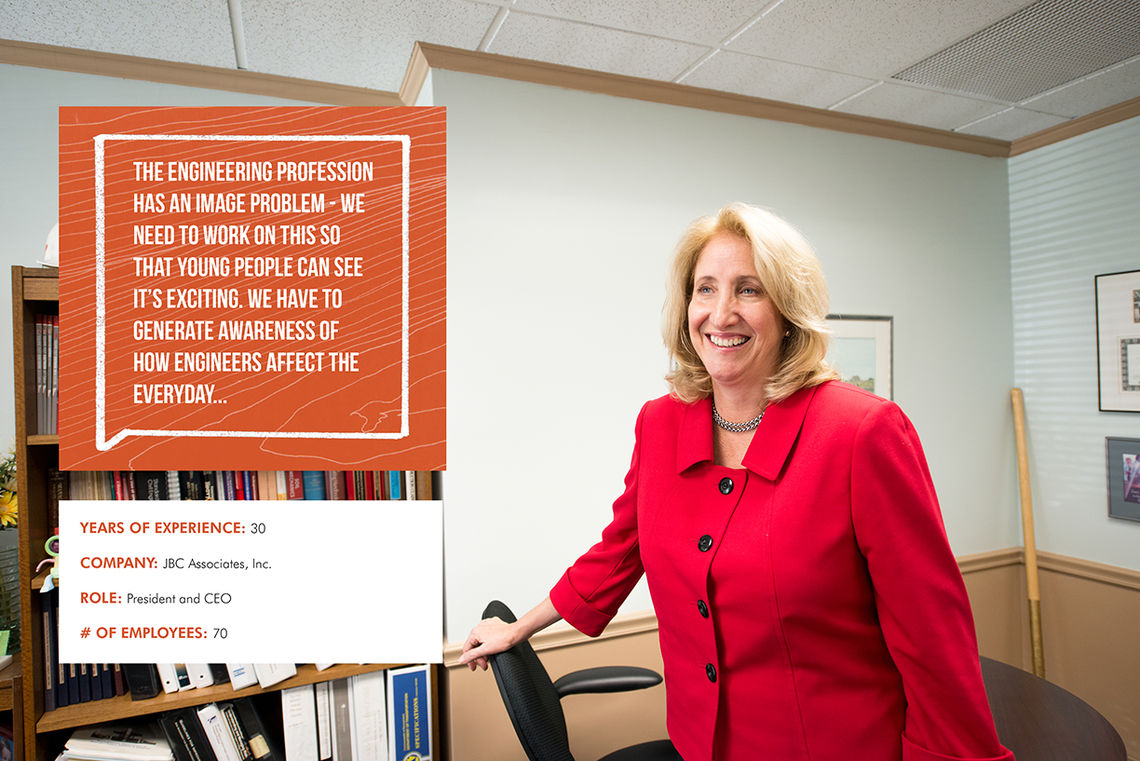
Janet Cunningham, PE never thought she would own a business. But after working in a couple of different jobs, she came to a crossroads in her career, saw an opportunity, and took a risk. With encouragement from her colleagues, she took the leap and founded her own construction consulting firm, JBC Associates, Inc., in 1988. While success did not happen overnight, the certified Disadvantaged/Woman Business Enterprise is now one of the Philadelphia area’s Top 100 Fastest Growing Privately Held Companies. It has also been a key player on several area projects, including being the prime consultant on the Pennsylvania Turnpike’s award-winning, four-way all- electronic interchange, a project in which Urban played a major role.
Getting started – As a kid, I got a lot of satisfaction out of creating things. Today, I still love seeing things get built. Challenges as a DBE – There is a stigma initially that you’re only there to fulfill a goal. Having been in the business for 26 years, we can stand on our own but just starting out it’s difficult. The engineering profession has an image problem – We need to work on this so that young people can see it’s exciting. We have to generate awareness of how engineers affect the stuff they see everyday like bridges and cars. We take these things for granted, but we wouldn’t have them without engineers. Seeing progress – Last year, 300 girls attended Widener University’s Engineering Mini-Camp. We need to do more of this. With having two sons, I’d like to see similar programs for them, too. Advice for young professionals – I think it’s important that young people have someone to take them under their wing and help guide them. I was fortunate to have several mentors in my life that helped me get in the right meetings, organizations, and meet the right people. Also, don’t be afraid to take on responsibility and be accountable for what you do.
Everyone Is Family Related Or Not
Manik Arora
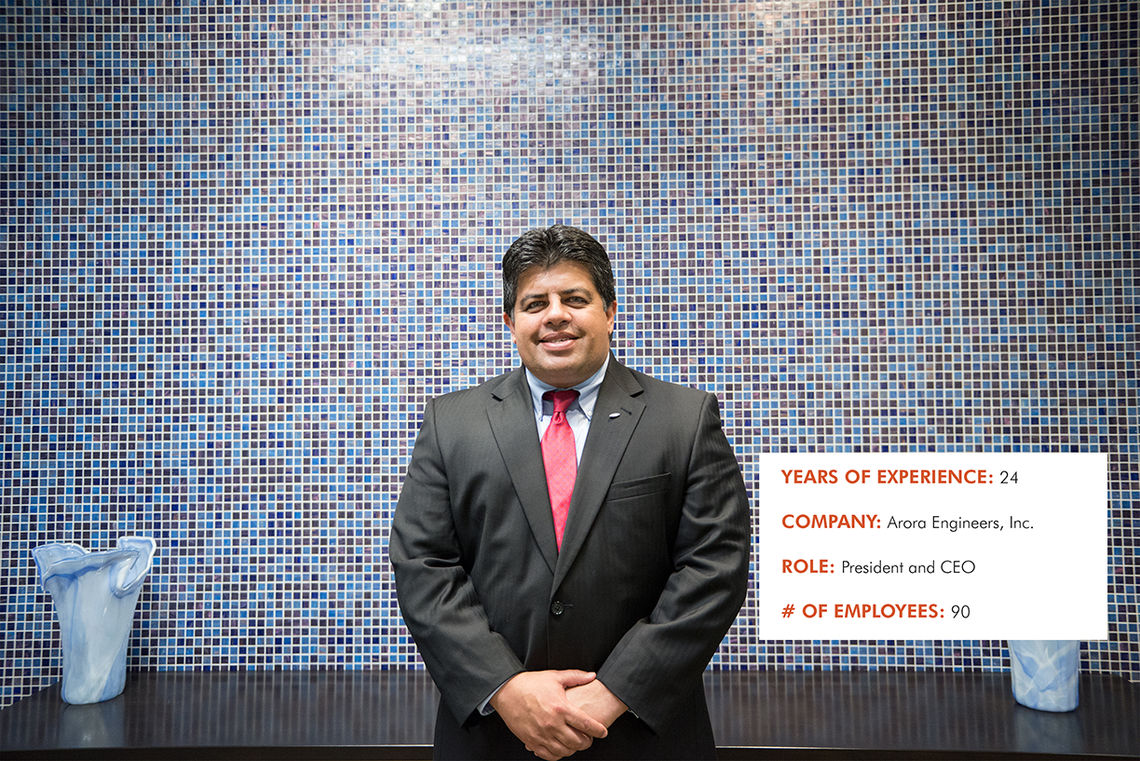
Manik Arora, PE became President and CEO of Arora Engineers, Inc. in 2006, taking over the business from his father, Manohar (Mike) L. Arora, MS, PE, who currently serves as Chairman. The two had been working side-by-side since the company was founded in the basement of their home in 1986. In the early days, Manohar was focused on the design side while Manik worked on the construction side. Today, Arora is a multi-disciplined engineering firm working in the fields of aviation, education, and transportation. The firm has been recognized by Zweig-White as one of the fastest-growing engineering consulting firms in the US.
Job satisfaction – I love the people who are associated with the firm. Everyone is family, related or not. I also like to see the firm be successful. There is no bigger joy as a president than to see someone who was living out of their college dorm be able to support a family. On being a DBE – We want to be the best firm period. If we do that, good things are going to come. Early challenges – We wondered if there would be enough opportunities for a DBE firm of our size to take a prime consultant role. In fact, there have been. Finding solutions – The perception has been that you had to give away a percentage and move on as a prime. We’ve been able to turn that perception into a mentor/protégé approach, such as with Urban. On some projects, we’ve been able to subcontract the work to Urban and on other projects they have been our prime consultant. Critical issues facing the industry – I’m concerned about the commoditization of engineering. If we’re going to deliver solutions faster through alternative project delivery, are we also going to disrespect quality to get there? As licensed engineers, we have to continually strive to understand the risks associated with what we design and the safe practices in implementing those designs.